|
|
|
Sort Order |
|
|
|
Items / Page
|
|
|
|
|
|
|
| Srl | Item |
| 1 |
ID:
170972
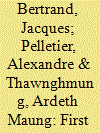

|
|
|
|
|
| Summary/Abstract |
The article argues that “first movers” and the bandwagoning effect they trigger can undermine the dynamics that perpetuate civil war and enable a multiparty cease-fire agreement. It looks at the unprecedented “nationwide” cease-fire in Myanmar reached between the government and several ethnic armed organizations in 2015. It shows that democratization and unilateral concessions by the Myanmar government were instrumental in overcoming the commitment problem and provided the necessary incentives for “first movers” to set the stage for a broad cease-fire agreement.
|
|
|
|
|
|
|
|
|
|
|
|
|
|
|
|
| 2 |
ID:
183818
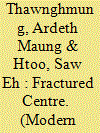

|
|
|
|
|
| Summary/Abstract |
This article analyses the evolving nature and dynamics of the relationship between the centre and the periphery by examining how semi-democratic reforms have shaped and influenced the peace negotiation process between the government and ethnic armed organizations (EAOs) since 2011. We demonstrate that while the 2008 constitution has reduced restrictions on political, economic, and cultural activities in Myanmar, it has also inevitably produced a ‘two-headed government’ after the main opposition party, the National League for Democracy (NLD), took charge in 2016 and was forced to share power with the military. This ‘two-headed’ government is the result of the historical distrust between the NLD and the army, combined with the NLD's lack of a clear strategy in dealing with EAOs. This has enabled the army to assert its well-articulated and hardline approach—without itself having an effective strategy or the capacity to end the country's armed insurgencies or bring the peace process forward. We show that the split at the centre has produced inertia and weakened the ability of the central government to formulate and implement effective policy, and further undermined the prospects for national reconciliation. Situating this case study within the wider literature of centre–periphery relationships and democratic transition, this article offers a nuanced and comprehensive analysis of how specific institutional arrangements at the centre in semi-democratic settings affect relations in both the centre and the periphery, as well as centre–periphery relationships.
|
|
|
|
|
|
|
|
|
|
|
|
|
|
|
|
| 3 |
ID:
107016
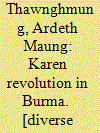

|
|
|
|
|
| Publication |
Washington, DC, East-West Center, 2008.
|
| Description |
xi, 81p.
|
| Series |
East-West Center policy studies series, 1547-1349; 45
|
| Standard Number |
9789812308047
|
|
|
|
|
|
|
|
|
|
|
|
Copies: C:1/I:0,R:0,Q:0
Circulation
| Accession# | Call# | Current Location | Status | Policy | Location |
| 056143 | 320.9591/THA 056143 | Main | On Shelf | General | |
|
|
|
|
| 4 |
ID:
178407
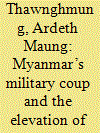

|
|
|
|
|
| Summary/Abstract |
The military overthrow of Myanmar’s elected government in February 2021 has again thrown into upheaval the troublesome relationship between civilian politicians and armed forces that has plagued the country since its first military coup in 1962. t has also brought back into view the relationship between Myanmar’s Bamar majority and the country’s ethnic minorities, a fractious issue that has long been subject to band-aid and patchwork solutions that skirt around the deeper causes of minority disaffection. Myanmar’s minority groups have long-standing grievances against the repression and brutality of the Bamar-dominated military and feel marginalized. Their attitude to the Bamar-dominated National League for Democracy (NLD) government of 2016-2021, led by Aung San Suu Kyi until her ouster and arrest, was one of despair at the continuing death and destruction brought by civil conflict, dismay at the silence of political leaders on the plight of civilians displaced by war, and anger at the quasi-authoritarian policies by the civilian administration. These dynamics have helped determine allegiances in the ongoing protests against military rule, pressed the ousted government into changing its policies to better reflect minority aspirations, and will likely transform Myanmar’s political landscape in a manner that would have been inconceivable before the coup.
|
|
|
|
|
|
|
|
|
|
|
|
|
|
|
|
| 5 |
ID:
145852
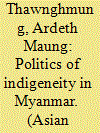

|
|
|
|
|
| Summary/Abstract |
This paper addresses a key issue that remains under-studied in discussions of Buddhist–Muslim hostility and violence in the northern Rakhine state in Myanmar. It reveals how the public narratives of both Rakhine Buddhist and Muslim political parties rely on the concept of ‘indigeneity’ to assert their claims as citizens and rightful sons of the soil, and to discredit the other’s position. This paper argues that this discourse, and the debate as it is presently formulated, has deepened the gap between two communities and obscured opportunities for identifying common ground that could be leveraged to foster more pragmatic approaches to deep-seated communal problems.
|
|
|
|
|
|
|
|
|
|
|
|
|
|
|
|
| 6 |
ID:
059509
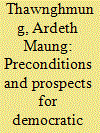

|
|
|
|
|
| Publication |
May-Jun 2003.
|
|
|
|
|
|
|
|
|
|
|
|
|
|
|
|
| 7 |
ID:
153421
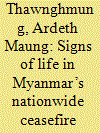

|
|
|
|
|
| Summary/Abstract |
This article focuses on peace-building efforts in Myanmar implemented under the Nation Wide Ceasefire Agreement (NCA) in 2013. It assesses the ways in which the recently elected government led by the National League for Democracy (NLD) has dealt with the NCA, and highlights opportunities and challenges. I argue that while the NLD government and Myanmar military remain crucial to the success of peace efforts, implementation of the NCA is impossible without the support of the eight current NCA signatories, in particularly the Karen National Union (KNU). Neglecting the importance of these actors not only provides an incomplete picture of ongoing peace-building efforts, but could also undermine efforts to promote national reconciliation that have thus far focused exclusively on the Myanmar government and the military. These signs of life emanating from the NCA signatories, however, have increasingly been undermined by an official failure to implement the agreement and to adhere to the agreed process and by ongoing hostilities between the military and four of the country’s ethnic armed groups.
|
|
|
|
|
|
|
|
|
|
|
|
|
|
|
|
|
|
|
|
|